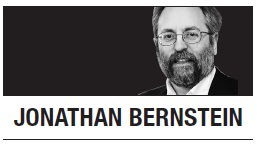
It’s time for the Democrats to winnow.
Twenty presidential candidates were set to debateTuesday and Wednesday. It’s their second round, and the last with so many candidates split over two nights. After this there’s a break until September, and the Democratic National Committee is making it harder to qualify for the next round. At best, maybe a dozen candidates will still be debating in September, and it’s hard to believe that anyone who can’t qualify can recover to win the nomination.
Going in, the polling had Joe Biden as a clear leader; Elizabeth Warren, Bernie Sanders and Kamala Harris grouped together behind him; Pete Buttigieg alone in fifth place; and then a whole bunch of candidates at 2 percent, 1 percent or less. Other indicators are arrayed somewhat differently. Buttigieg took in a ton of money in the most recent quarter, putting him in the top tier by that indicator. Biden leads in endorsements with Harris in a solid second place, but Cory Booker and Amy Klobuchar are in third and fourth place; whether that’s an indication of their strength, or a sign of weakness from Sanders and Warren, is a good question at this point.
While some smart observers think that little will change outside of the top tier, I continue to think there’s a real opportunity for one or more of the candidates trailing in the polls to surge. The nomination still seems wide open to me, with each of the top polling candidates having real nomination weaknesses, although any of them could win if things break right. As far as candidates are concerned, I’d sort the importance of this debate this way:
Highest stakes
The group of candidates who appear unlikely to qualify for the September debates, but could still be serious contenders if they were to have a big debate moment and surge. But first they have to make it to that September stage. All they need is to register 2 percent in four different polls, so we’re not talking about a leap. Just a real step forward. I’d put Jay Inslee, Kirsten Gillibrand, Steve Bullock, and maybe John Hickenlooper and Michael Bennet in this group.
High stakes
Another group consists of those who have qualified or are likely to qualify for September and could be serious contenders if they enter the top group but aren’t there yet. That’s Booker, Klobuchar, Beto O’Rourke and Julian Castro.
High-ish stakes
Sanders has been treated as a top candidate throughout the cycle. His polling has been on a downward slope, however, and if he falls any further, it’s easy to imagine him losing a lot of free media as more pundits consider him yesterday’s news.
Low stakes (Part 1)
Because they have little chance: Also appearing on the debate stage will be Andrew Yang, Marianne Williamson, John Delaney, Tim Ryan, Tulsi Gabbard and Bill de Blasio. None of them appear to have any significant party support. Yang is actually likely to qualify for September, and while I suppose we should never rule anyone entirely out, it’s difficult to see anyone from this group winning the nomination even if they happen to catch fire and improve their standing in the polls.
Low stakes (Part 2)
Because they’ve already won their ticket division: Biden, Warren, Harris and Buttigieg. Sure, everyone’s eyes are going to be on the polling front-runners. But the odds are strong that this group will be around for the next several months regardless of how they do Tuesday and Wednesday nights, and shuffling their standings for now probably won’t predict much about where they’ll be by the time the voting begins in February. These are the kinds of candidates for whom the significance of debates tends to be overrated.
But remember: Debates, and the nomination process overall, are as much about the party defining itself as they are about which candidate “wins.” On policy, immigration, health care and, of all things, busing, grabbed the most attention in the first debate rounds. Plenty of advocates are out there pushing for their issue to get more air time; we’ll see if any of them succeed. In particular, the nomination and these debates are going to go a long way in determining how high climate really is on the Democratic agenda. Any Democratic president will act on it, but whether it’s at the top of the agenda or not probably depends on how party actors, and the candidates, deal with it right now.
Jonathan Bernstein
Jonathan Bernstein is a Bloomberg Opinion columnist covering politics and policy. He taught political science at the University of Texas at San Antonio and DePauw University. -- Ed.
(Bloomberg)







![[Today’s K-pop] Blackpink’s Jennie, Lisa invited to Coachella as solo acts](http://res.heraldm.com/phpwas/restmb_idxmake.php?idx=644&simg=/content/image/2024/11/21/20241121050099_0.jpg)
